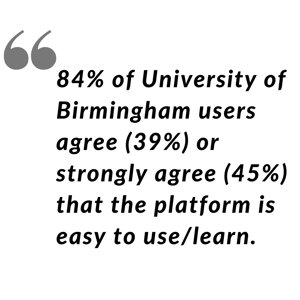Moving STEM instruction online and creating compelling courses presents unique challenges, which take time, planning, and resources to overcome. Let’s look at how Graide’s AI-powered feedback and assessment platform meets the requirements for teaching maths-based STEM subjects, providing an engaging student experience, improving student learning outcomes, and saving teachers hours of precious time.
Workload
Too much to do and too little time – that’s the perennial issue for academics. It’s a long-hours profession. They’d like to have more time for marking, but they don't. Ideally, they’d like to have more time to help students in a pastoral or mentoring capacity, too.
Graide Efficacy Research, done with the University of Birmingham, compared grading on paper to the Graide platform for 10 questions with 172 submissions per question. Graide reduces median grading times by 74%. The AI oversees how each section of an answer is marked, learns how educators give feedback, and then replicates it at scale. In essence, replay grading on Graide means not having to mark the same type of answer twice.

Set-up costs – time and training
One obvious objection to adopting new technology or systems is set-up costs, in terms of timing and training. With Graide, it isn’t a question of buying software and then having to work things out on your own, however. In fact, no coding or technical knowledge is needed. Setting up Graide is a relatively speedy and straightforward process. It’s principally a matter of transferring PDFs to the Graide platform. Assignments are easy to convert as you just copy/paste existing questions directly. You’ll find our onboarding videos, explainer content, and web session cover all the essentials. Furthermore, Graide is happy to help set up, demo, and advise. We work closely with all our partners, from the outset.
If you have any difficulties, Graide is on hand to help, providing email support within 2 working days.

14% are neutral to the above statement.
Teaching algorithms to mark for you saves so much time in the long run.
Individual teachers develop a comprehensive question-and-answer bank over time. When these are shared across departments, weeks of time can be saved over the years.
There is also the handy automatic collation of marks and transference to grade books, along with the time saved when this is all integrated into your LMS.
Set-up costs – financial
Marking costs universities thousands of staff hours every year. We charge an annual fee of £30 per student, which covers all the modules your students have, including replay grading, exam grading, batch script uploads, and much more.
We estimate that a university with 3,500 STEM students using Graide could save over £240,000 a year, in terms of paid hours and freeing up academics to do other things.
Timely assessment and feedback
For marking and feedback, time is of the essence. University policies commonly stipulate feedback within two to three weeks. Students would prefer something sooner, preferably when the work is fresh in their minds, if at all possible. Graide enables that.
Submission of student work is effectively instantaneous, without students needing to hand work in a physically-a boon for students with access or mobility issues.
Furthermore, Graide facilitates feedback within days which is especially important if students have exams approaching. Timely feedback allows them to reassess strengths, identify areas for improvement, and take remedial action. All this minimises uncertainty and stress for students.
It’s worth noting that, as opposed to paper, the same script can be marked in parallel: in other words, different teachers can mark their particular section of a paper at the same time. That way there is no time lag in marking or admin.
There is also greater consistency than when you have several teachers for different components of a course. Graide marks, in the same way, every single time.
Quality feedback
As well as relative immediacy, automation ensures accuracy and usability, the cornerstones of assessment. Students expect and deserve an assessment which is accurate: i.e. free from subjectivity and human error. They also want detailed quality feedback. In an ideal world, we’d all give more time to feedback, but that means eating into or dispensing with other tasks such as course design and preparation.
The Replay Grading workflow means the entire response receives high-quality feedback, with the number of words of the feedback given increased by a factor of 7.2.
The RAG rating also gives students an overview of current progress:
- red (answers need work)
- amber (nearly there)
- green (sound answer)
Timely intervention
Timely intervention is imperative when helping students who may need more support. Prompt feedback means educators can identify struggling students earlier and take appropriate supportive action.
Graide helps facilitate clear, comprehensive feedback, every time, allowing for detailed assessment and action plans moving forward. The platform uses AI to analyse student responses during marking, allowing teachers to give feedback anywhere on the student’s approach, not just the final answer.
Further diagnostics can troubleshoot, flagging up common misconceptions which need revisiting, or identifying struggling individuals who need extra help. All this saves time and improves student outcomes in the long term.
Just as importantly, offering digital assessment can help expand an institution’s reach by attracting more students, from a wider, more diverse range of backgrounds.
Marking and feedback are fundamental to learning and progress. Thoughtful, accurate feedback provides the road map for future improvement.
Digital solutions don’t suit every assessment challenge, but delegating much of the marking process to AI frees up staff hours that can be better spent on the assessment that needs a more direct human approach. Graide perfectly assists the hybrid model, which appeals to today’s students, who value flexibility and accessibility. Using the best of both worlds leads to the most equitable student experience.
Further reading
University of Birmingham - Graide Efficacy Research


